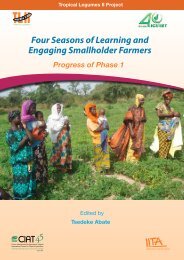Four Seasons of Learning and Engaging Smallholder Farmers - icrisat
Four Seasons of Learning and Engaging Smallholder Farmers - icrisat
Four Seasons of Learning and Engaging Smallholder Farmers - icrisat
Create successful ePaper yourself
Turn your PDF publications into a flip-book with our unique Google optimized e-Paper software.
In Karnataka, the PDKV model was promoted. During 2010 rainy season, 10 kg <strong>of</strong> ICGV-91114 kernel<br />
which is sufficient for sowing in 0.25 acre was distributed to 330 farmers each in 33 villages <strong>of</strong> three<br />
major groundnut growing districts <strong>of</strong> southern Karnataka i.e., Tumkur, Chikballpur, Chitradurga. In<br />
Bagalkot district, the UAS-Dharwad partner has promoted a semi-informal seed, which has linkages<br />
with the formal seed system. This model has been popular <strong>and</strong> is implemented successfully for the past<br />
four years. In this model basic seed is supplied to the farmers by the university <strong>and</strong> farmers can <strong>of</strong>fer for<br />
certification <strong>and</strong> enter formal seed chain or without certification but being monitored by university they<br />
can produce truthfully labeled seed.<br />
At Raichur also the system similar to that in UAS-Dharwad is under implementation since 2010 rainy season.<br />
Constraints <strong>and</strong> opportunities for legume seed systems<br />
TNAU has prepared a policy brief on “Groundnut seed plan” for the state <strong>of</strong> Tamil Nadu <strong>and</strong> has<br />
communicated to policy makers. The salient findings <strong>and</strong> recommendations are as follows:<br />
• In Tamil Nadu, the present seed replacement rate is around 3%;<br />
• Local traders are the major suppliers <strong>of</strong> seed;<br />
• Genetic purity <strong>and</strong> minimum germination st<strong>and</strong>ards are not assured;<br />
• The cost <strong>of</strong> seed is usually high due to transportation charges;<br />
• The supply <strong>of</strong> seed is restricted to old varieties;<br />
• In order to improve the formal seed system, a vibrant public sector needs to be involved; <strong>and</strong><br />
• Organization/agency is necessary. There is a great opportunity to establish a dedicated autonomous<br />
state seed corporation or forming an independent seed producing agency as a wing <strong>of</strong> department<br />
<strong>of</strong> Agriculture Tamil Nadu State Seed Corporation has to be established similar to the corporations<br />
in other states <strong>of</strong> the country.<br />
Formal <strong>and</strong> informal seed sector linkages<br />
In two districts <strong>of</strong> Tamil Nadu - Erode <strong>and</strong> Thiruvannamalai - linkages were established between formal<br />
<strong>and</strong> informal sectors through seed village model where basic quality seed is supplied by the university.<br />
Similarly, in two districts <strong>of</strong> Karnataka - Bagalkot <strong>and</strong> Raichur - semi-formal seed systems were promoted<br />
<strong>and</strong> found to be a very successful model to meet the groundnut seed dem<strong>and</strong>. Here also, the linkage<br />
was facilitated by supply <strong>of</strong> quality seed to farmers; in addition, farmers can <strong>of</strong>fer the seed production<br />
30<br />
<strong>Engaging</strong> <strong>Smallholder</strong> <strong>Farmers</strong> | Tropical Legumes II Project

















